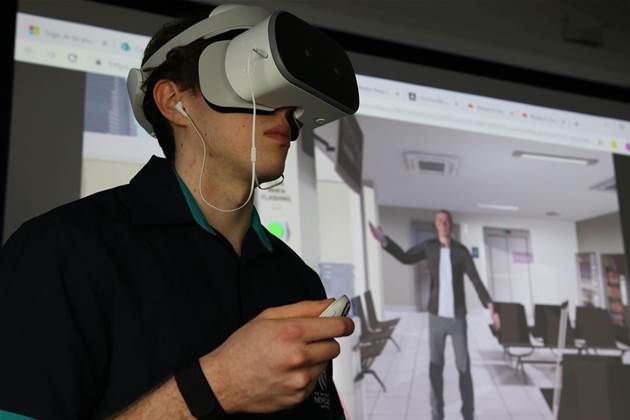Nursing students at the University of Newcastle can now practice their conflict resolution skills in a virtual reality scenario that responds to their biological reaction to the conflict.

The simulator builds on the extensive work with the uni’s IT Services Innovation team, which has so far produced VR experiences to help midwifery and oral health students practice high-risk and stressful procedures in relative safety.
‘Angry Stan,’ the avatar in the second-year students undertaking the mental health module interact with, was based off real-world interactions the nursing and midwifery staff had faced.
Stan responds to a student’s heart rate, which is combined with multiple-choice dialogue so students can try and diffuse the situation and practice controlling their stress levels, managing conflict and building resilience in the classroom before entering the workforce.
“Essentially, the calmer they remain, the easier Stan and the scenario is to deal with,” project lead Dr Donovan Jones said.
“Even if unprovocative responses are selected by the user, the wording is altered to be more provocative if the technology picks up from their heart rate that they are stressed.”
IT Innovation Team project manager, Vendela Pento, added that VR represents a significant advancement on how conflict resolution was previously taught.
“Traditionally, conflict resolution has been taught ad-hoc with textbooks and paid actors, which can be pretty uninspiring or very expensive,” she said.
“What’s unique about the new program is the user is totally immersed in the scenario so we can build resilience in a whole new way.
“The days of teaching en masse are behind us. The qualitative and quantitative responses to the program actually help us learn from the students so we can tailor education to individuals, ensuring a deeper teaching and learning experience.”
Professor of mental health nursing, Mike Hazelton, added that Stan is modelled as a person in an emergency environment looking for his friend who had been brought in as a patient and is becoming increasingly agitated.
“We support a zero tolerance for violence against healthcare workers, which is why it was imperative to develop an immersive training program where students can practise dealing with these potential situations in a safe, repeatable and realistic environment,” he said.
Jones added that a PhD student is now undertaking a research project to measure the success of Conflict Resolution and adapt the program as students’ needs evolve.
He also said that the team is looking at how to make the program available as a tool to build resilience outside the higher education sector.
“Equipping employees with ways to maintain their mental health should be of paramount importance. We realise that dealing with conflict in the workplace isn’t something that’s exclusive to healthcare.
“Moving forward, we’d like to explore gender roles and environments within Conflict Resolution to make it applicable to people working across a range of industries,” he said.



_(23).jpg&h=140&w=231&c=1&s=0)
_(20).jpg&h=140&w=231&c=1&s=0)
.png&h=140&w=231&c=1&s=0)





 iTnews Executive Retreat - Security Leaders Edition
iTnews Executive Retreat - Security Leaders Edition
 Huntress + Eftsure Virtual Event -Fighting A New Frontier of Cyber-Fraud: How Leaders Can Work Together
Huntress + Eftsure Virtual Event -Fighting A New Frontier of Cyber-Fraud: How Leaders Can Work Together
 iTnews Cloud Covered Breakfast Summit
iTnews Cloud Covered Breakfast Summit
 Melbourne Cloud & Datacenter Convention 2026
Melbourne Cloud & Datacenter Convention 2026
 The 2026 iAwards
The 2026 iAwards












_(1).jpg&h=140&w=231&c=1&s=0)



